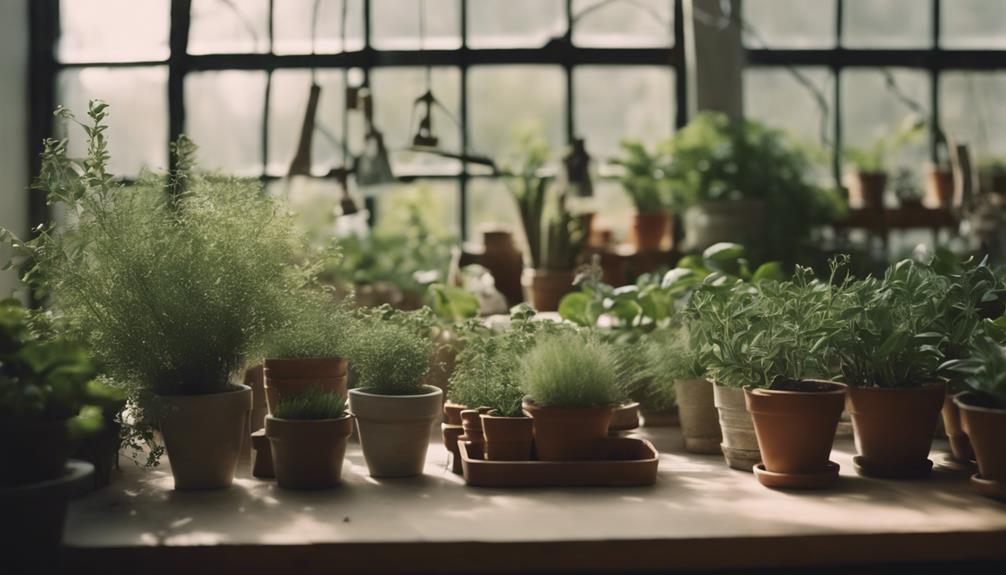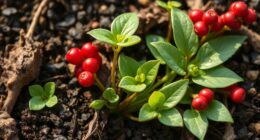As Christians, we often wonder if herbalism contradicts our faith. However, when approached responsibly, herbalism can be a thoughtful way to harness the healing potential of plants while honoring our Christian values. Herbal remedies are gifts from God's creation, and the Bible references healing plants like frankincense and myrrh. By avoiding pagan influences and focusing on medicinal properties, we can use herbal medicine to promote holistic health and express gratitude for God's creation. As we explore the coexistence of herbalism and Christianity, we discover a deeper connection to the natural world and our faith. To understand the nuances of this relationship, let's examine the ancient roots and biblical references that shape our perspective.
Key Takeaways
• Herbalism is not inherently sinful, as it utilizes God's creation for healing and wellness, aligning with Christian values of stewardship and gratitude.
• The Bible references healing plants like frankincense and myrrh, endorsing the use of plant-based medicine in Christian faith.
• Responsible use of herbal medicine reflects a Christian's reverence for God's creation and promotes holistic health, respecting the body as a temple of the Holy Spirit.
• Herbalism can be practiced without pagan influences by focusing on medicinal properties, praying for guidance, and recognizing God as the ultimate healer.
• When used wisely and informedly, herbal medicine can be a way to express gratitude for God's gifts and promote well-being, aligning with Christian ethics and values.
A Gift From God's Creation
As we explore the world of herbalism, we must acknowledge that the natural remedies it provides are, in fact, a testimony from God's creation. The Bible itself references the use of healing plants like frankincense and myrrh, showcasing God's approval of plant-based medicine.
Plants are gifts from the creator, designed to meet human and creature needs, highlighting their significance in Christian beliefs. When we use herbal medicine responsibly, we align with Christian values, emphasizing gratitude for God's creations.
Herbal Medicine, with its medicinal purposes and healing properties, is a reflection of God's provision. By acknowledging the creator's gift of plants and using them wisely, we reflect Christian principles of stewardship and care for the Earth.
As we appreciate the natural remedies God has provided, we recognize the importance of responsible use, ensuring we honor God's creation. By doing so, we can harness the full potential of Herbal Medicine, respecting the creator's intent for these gifts.
The Ancient Roots of Herbalism

As we explore the ancient roots of herbalism, we'll uncover the fascinating stories of early herbal practices, where ancient medicine men relied on plant wisdom to heal and cure.
We'll examine how these ancient civilizations recognized the medicinal value of plants, often using them in tandem with spiritual practices.
Early Herbal Practices
We explore the ancient roots of herbalism, uncovering evidence of early civilizations' sophisticated uses of plants for healing and cosmetic purposes.
The Egyptians, Greeks, and Romans, for instance, harnessed the medicinal properties of plants to treat chronic diseases and enhance their physical appearance.
In ancient China and India, complex herbal healing systems were developed, many of which are still practiced today.
We've discovered that plants like willow bark, foxglove, and St. John's Wort have provided medicinal compounds that led to the development of modern pharmaceuticals.
The use of plants for healing aligns with early Christian beliefs, as seen in references to healing plants like frankincense and myrrh in the Bible.
Herbal medicine has been a common practice globally until recent times, showcasing its deep historical significance.
As we investigate the history of herbalism, it's clear that our ancestors were well-versed in the medicinal properties of plants, using them to treat a range of ailments, from everyday complaints to chronic diseases.
Ancient Medicine Men
In the dawn of human civilization, ancient medicine men emerged as the pioneers of herbalism, harnessing the potent properties of plants to heal the sick and maintain balance in their communities.
We find evidence of their practices in ancient civilizations like Egypt, China, and Greece, where herbalism dates back thousands of years. These early healers believed in the power of plants to treat illnesses and maintain health.
They didn't just prescribe herbal remedies; they often accompanied them with spiritual rituals and beliefs in the interconnectedness of nature and healing. The roots of herbalism as a healing practice are deeply intertwined with ancient spiritual and cultural traditions.
As we explore the history of herbalism, we realize that these ancient medicine men were more than just healers – they were spiritual leaders, bridging the gap between the natural and spiritual worlds. Their understanding of the natural world and its healing properties paved the way for the development of herbalism as we understand it today.
Plant Wisdom
We've inherited a rich legacy of plant wisdom from our ancient ancestors, who intuitively understood the intricate connections between the natural world and human well-being. The use of medicinal herbs dates back to the world's oldest mummy, Otzi, who carried various medicinal plants.
Civilizations like the Egyptians, Chinese, Greeks, and Romans all utilized plants for healing and health, demonstrating the significance of herbalism in our collective past.
Many medicinal compounds, such as aspirin, digitalis, and St. John's Wort, are derived from plants, showcasing the healing power of herbs. Furthermore, plants like ginger, turmeric, and hops have dual culinary and medicinal purposes, highlighting their versatility.
In many cultures, plants are considered gifts from the creator, emphasizing the importance of responsible plant wisdom. Notably, the Bible references healing plants like frankincense and myrrh, aligning herbal medicine with Christian beliefs.
Biblical References to Healing Plants

Throughout the Bible, God's endorsement of plant-based medicine is evident in numerous references to healing plants, which underscores the significance of herbalism in Christian faith. We find examples of this in the use of aromatic plants like frankincense and myrrh, which held medicinal and spiritual value.
In Exodus 30:22-25, God provides a recipe for anointing oil using these plants, demonstrating their importance in healing and spiritual practices. Even Jesus used natural elements, like spit and mud made from clay, to heal a blind man, illustrating the use of natural remedies in the Bible.
Furthermore, the Book of Revelation 22:2 describes the leaves of the tree of life as having healing properties, further emphasizing the significance of plants in God's design for healing. These biblical references to plants for healing suggest that herbalism aligns with Christian beliefs and can be seen as a gift from God for human well-being.
As we explore the intersection of faith and herbalism, it's essential to acknowledge the Bible's endorsement of plant-based medicine, which has significant implications for our understanding of herbalism in the Christian faith.
Avoiding Pagan Influences in Herbalism

As we explore the world of herbalism, we must exercise caution to avoid unwittingly embracing pagan influences that could compromise our Christian beliefs. Conducting research on the history and origins of herbal practices is crucial to verify they do not contradict or go against Christian teachings.
| Herbal Practice | Pagan Influence | Christian Alternative |
|---|---|---|
| Using herbs in rituals | Associating herbs with spirits or gods | Focus on medicinal properties |
| Practicing magic or divination | Invoking supernatural powers | Praying for guidance and discernment |
| Worshiping nature or idols | Idolizing creation over the Creator | Recognizing God as the ultimate healer |
| Using herbs for spiritual growth | Seeking spiritual enlightenment | Focusing on physical health and wellness |
| Involving astrology or zodiacs | Associating herbs with celestial bodies | Separating herbalism from astrological practices |
We must be mindful of the fine line between using herbs for medicinal purposes and embracing pagan rituals or beliefs. By being aware of these potential influences, we can navigate the world of herbalism while upholding our Christian values.
Wise Use of Herbal Medicine

By embracing herbal medicine responsibly, we can harness the healing potential of plants to promote our well-being while honoring God's creation. As Christians, we acknowledge the gift of plants from the creator and recognize their value in maintaining our health. The Bible itself references the use of plants for healing, supporting the compatibility of herbal medicine with Christianity.
By using herbal remedies thoughtfully and informedly, we can promote holistic health and care for our bodies, as instructed in Scripture. This approach aligns with Christian values of stewardship and caring for the body, which is a temple of the Holy Spirit.
As we utilize herbal medicine, we must remain mindful of its potential benefits and limitations, ensuring we use it responsibly and under the guidance of medical professionals when necessary. By doing so, we can harness the healing potential of plants while honoring God's creation and promoting our overall well-being.
Coexisting With Christianity

We recognize that herbal medicine can coexist with our Christian faith, just as it has for centuries, when we approach it with reverence and gratitude for the natural world. As Christians, we believe that plants are gifts from the creator, intended for our use and benefit. The Bible itself references healing plants like frankincense and myrrh, indicating God's encouragement of plant use for healing.
Here's a breakdown of how herbalism and Christianity can coexist:
| Aspect | Christian Perspective |
|---|---|
| Plant Use | Plants are gifts from the creator for human use and benefit |
| Biblical Reference | Frankincense and myrrh are mentioned in the Bible as healing plants |
| Responsible Use | Aligns with Christian values of responsible stewardship and gratitude |
| Expression of Faith | Using plants wisely is an expression of gratitude and reverence for the natural world |
Frequently Asked Questions
What Does the Bible Say About Herbal Medicine?
We find that the Bible has a neutral stance on herbal medicine, neither condemning nor explicitly endorsing it. Instead, it acknowledges the medicinal value of plants, as seen in the examples of frankincense and myrrh.
The Bible encourages responsible use of natural resources, including plants, aligning with Christian values of stewardship and care for the body.
What Does God Say About Herb?
As we ponder what God says about herbs, we find ourselves coincidentally aligning with the Bible's stance on the matter. God's design of plants for healing purposes suggests He intended for us to utilize them for our well-being.
The biblical mention of herbs like frankincense and myrrh reinforces this idea. We believe God's message is clear: herbs are a gift, and using them responsibly and with gratitude honors His creation and care for our bodies.
What Does the Bible Say About Herbal Tea?
We find that the Bible doesn't explicitly mention herbal tea, but it does reference plants' healing and nourishing properties.
Herbal teas, made from plant parts like leaves and seeds, can offer health benefits like relaxation and immune support.
As Christians, we can appreciate herbal tea as a gift from God, acknowledging His provision for our well-being.
What Is the Religion of Herbalism?
'As the saying goes, 'the truth is in the details.' When it comes to herbalism, we find that it's not a religion at all. Herbalism is a traditional practice that focuses on the medicinal properties of plants, and it doesn't require a specific religious affiliation.
We, as herbalists, come from diverse religious backgrounds, including Christianity, Buddhism, Islam, and others. Our shared interest lies in harnessing the natural healing powers of plants, regardless of our religious beliefs.'
Conclusion
As we wander through the garden of God's creation, we're reminded that herbalism can be a sacred tool for healing, just as the ancient Israelites and early Christians once used it.
Like threads in a tapestry, faith and herbalism intertwine, each enriching the other. By embracing this harmony, we can access the medicinal power of plants while staying true to our Christian roots.
As we tend to the garden of our bodies and the garden of our souls, may we cultivate wisdom, discernment, and a deeper connection with the divine.










